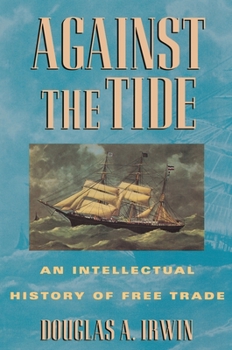Against the Tide: An Intellectual History of Free Trade
Select Format
Select Condition 
Book Overview
About two hundred years ago, largely as a result of Adam Smith's Wealth of Nations, free trade achieved an intellectual status unrivaled by any other doctrine in the field of economics. What accounts for the success of free trade against then prevailing mercantilist doctrines? And how well has free trade withstood various theoretical attacks that have challenged it since Adam Smith's time? In this readable intellectual history, Douglas Irwin...
Format:Paperback
Language:English
ISBN:0691058962
ISBN13:9780691058962
Release Date:December 1997
Publisher:Princeton University Press
Length:280 Pages
Weight:0.96 lbs.
Dimensions:0.7" x 6.2" x 9.2"
Related Subjects
Accounting & Finance Business Business & Investing Economic History Economics InternationalCustomer Reviews
5 ratings
Great book - shoddy reviewers
Published by Thriftbooks.com User , 21 years ago
Fantastic analysis of international free trade and the coming of age of economic globalization. Irwin is a diamond in the rough when it comes to economic author. He writes in such a way that is fairly easy to understand, all the while not comprimising the quality of the material. Granted, any previous knowledge of Economics is obviously beneficial to the reader, but in no way an absolute must.Second, Mr. Preston Enright above seems to oppose corporate subsidies and welfare. Well, Mr Enright, so do the most staunch defenders of free-trade and capitalism: libertarians. I would not so much call myself a Libertarian but, like yourself, am also ardently opposed to corporate welfare, as it places an unwarranted burden on taxpayers and forces them to involuntarily support a cause, whereas they should only support the firm with their purchases from that corporation. Corporate welfare is, indeed, a rotten policy enacted but liberals and conservatives alike that, just as other forms of subsidies and welfare, create an unhealthy and unwarranted dependency on Washington (or wherever the largesse may originate), artificially lower prices, discourages innovation and efficiency, and ultimately harms the taxpayer and the consumer. Preston Enright is correct that this type of 'free trade' (not free to the mass of those who should benefit: the consumer) is only beneficial to the management and executives. Although, I'm guessing by his scattered and fiery writing style that he would be opposed to the free market, welfare or no welfare.
An informed discussion of free trade
Published by Thriftbooks.com User , 23 years ago
Economics is one of those subjects on which everyone has an opinion but few have much knowledge. Free trade, in particular, suffers from this opinion/knowledge gap. Reviewer Enright provides a good demonstration of this affliction. Had he taken the time to read the entire book, rather than just skimming the last few pages looking for some commentary on the politicization of free trade, Enright might have learned something about the benefits of free trade. Irwin's text provides an excellent overview of how economic thinking has over the years come to accept and promote free trade. Unfortunately, today's free trade debate is typically not framed by such informed discussion, but rather is shaped by the protectionist rantings of critics like Enright.
Fundamental reading for leaders of developing nations.
Published by Thriftbooks.com User , 27 years ago
The book is dense and that will scare off some. But the insight that Irwin provides us; that all the arguments we hear today against free trade are hundreds and even thousdands of years old, makes the reader want to examine the roots of these perspectives even more. If these are indeed patterns of history, than how do we change the minds of leaders, and get them focussed all in the same direction? Read: Competitive Advantage of Nations by Michael Porter;and Plowing the Sea by Michael Fairbanks and Stace Lindsay
Krugman's review is on line.
Published by Thriftbooks.com User , 27 years ago
Preeminent economist and NPR poster-boy Paul Krugman's review of this book is online: http://web.mit.edu/krugman/www/irwin.html
One of the best books on economics in 1996
Published by Thriftbooks.com User , 27 years ago
Professor Irwin writes a stunning history of the thought on international trade ranging from the early greek philosophers' views on trade relations with neighboring cities, through the English mercantilist thought of the 17th and 18th centuries to the recent literature on strategic trade theory. While covering such a broad sweep of historical thought the book loses neither focus nor interest. At just over 200 pages, and non-technical in language, the book is extremely accessible. It is a must read for any student of international trade, whether casual or professional. Professor Irwin has published widely in the area of the political economy of international trade, among others. His writings include several other books on international trade and political economy more suited to the professional economist which are also highly recommended.





